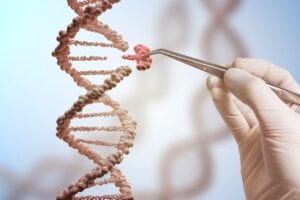June 7, 2023

Bayer has licensed lipid nanoparticle (LNP) technology from Acuitas Therapeutics to develop in vivo gene editing and protein replacement programs in the liver.
Bayer has joined forces with Acuitas Therapeutics, a Canadian biotechnology company specializing in LNP delivery of nucleic acid therapeutics.
The partnership grants Bayer, and its affiliate Asklepios BioPharmaceutical (AskBio), access to Acuitas’ LNP technology. Bayer and AskBio will provide the gene editing technologies.

Image: DepositPhotos/
vchalup2
“The collaboration will focus on developing and enabling in vivo genome editing CRISPR therapies for rare, life-threatening genetic diseases, with initial focus on conditions affecting the liver. Our goal is to dramatically improve the life of patients who have limited or no options,” a Bayer spokesperson told BioProcess Insider.
Jost Reinhardt, head of Cell and Gene Therapy, Pharmaceuticals Division, Bayer, adds: “Adding Acuitas’ clinically-validated and scalable LNP technology to our genomic medicine toolbox is another important step to advance our leadership in the field of cell and gene therapies.”
The financial details of the licensing agreement have not been disclosed.
Acuitas’ LNP Technology
LNPs are drug delivery vehicles that can be used in molecular therapeutics.
Acuitas’ LNP technology allows intracellular delivery of nucleic acid therapeutics such as mRNA, microRNA, oligonucleotides, and DNA to different target organs. This technology is clinically validated, and previous applications include the development of the Pfizer/BioNTech COIVD-19 vaccinations, administered to 180 countries.
LNP technology has advantages compared to other delivery systems, such as viral vectors and extracellular vesicles, by utilising lipids’ natural properties.
Lipids “are highly flexible, are biodegradable and allow you to use biological processes to your advantage,” Pieter Cullis, co-founder of Acuitas Therapeutics, said in a Nature article in 2021.
“The way in which lipid nanoparticle – RNA systems gain access to hepatocytes in the liver, by adsorbing Apolipoprotein E (ApoE) following intravenous injection, triggers uptake into hepatocytes via low-density lipoprotein (LDL) and other receptors,” says Cullis.
These properties are preferable for Bayer, which will use the natural properties of LNPs to gain access to the liver.
Bayer is not the only big player accessing Acuitas’ LNP technology. In 2022, Pfizer and Arbor Biotechnologies both partnered with Acuitas Therapeutics to access its LNP technology for mRNA vaccines and therapies.
About the Author
You May Also Like



